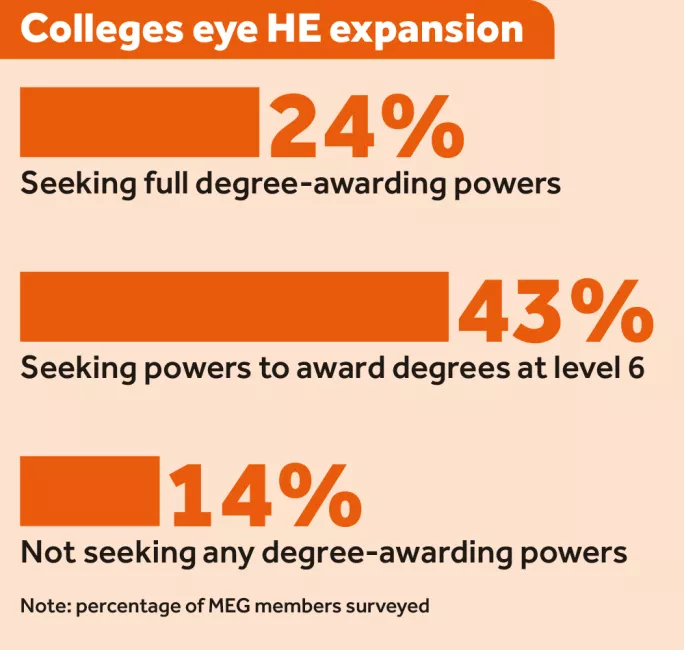While universities minister Jo Johnson believes that new “challenger institutions” offering cut-price provision could be the future of higher education, FE colleges already operating in the market are more worried about competition from their traditional university rivals.
A survey by the Mixed Economy Group (MEG), a group of colleges offering HE, shows that colleges view increased competition by universities as the biggest threat to college-based HE provision. Ninety per cent of respondents said they were most concerned about the prospect.
Many also remain worried about the uncertainty inherent in their dependency on universities to validate their degree provision - 57 per cent of the colleges said that this was one of their three biggest concerns.
While more than 240 colleges in England currently offer HE qualifications, only five have their own foundation degree-awarding powers. In June 2016, NCG became the first to gain full taught degree-awarding powers.
Other colleges rely on university partners to validate their degree provision - leaving them at the mercy of their partners. Last spring, 10 colleges were left looking for a new partner after Teesside University cancelled its validation agreements following a change in strategy.
The Higher Education and Research Bill, which had its fourth reading in the House of Lords this week, is intended to make it easier for HE providers, including colleges, to gain the power to award their own degrees.
According to the MEG survey, nearly a quarter of colleges said that they planned to pursue full degree-awarding powers, while 43 per cent expressed an interest in acquiring the powers to award degrees at level 6. Only 14 per cent of the colleges that took part in the survey said that they had no plans to seek any new powers.
MEG chair John Widdowson - also principal of New College Durham, which holds foundation degree-awarding powers - says that the college already has to compete with universities in the region. “What degree-awarding powers do is give us the power to level the playing field,” he says.
Tony Lewin, principal of Newcastle College (part of NCG), believes that HE is a “great opportunity” for the sector, with its provision tailored towards students interested in developing practical skills.
The HE bill, however, is a “double-edged sword”, Mr Lewin says: “It gives the opportunity for the providers that have the critical mass to go for degree-awarding powers.
“But equally, because of the drop in Ucas application numbers, we are seeing universities making more unconditional offers. That will draw away from [our] market.”
Overall, the 21 colleges that took part in the survey were more optimistic about the future of HE provision in colleges than in previous years, MEG concludes. Nine predicted growth in HE student numbers, with the same total saying that they expected enrolments to remain the same. Only three colleges anticipated that numbers would reduce.
Risk to apprenticeships growth
The most promising area of growth, the colleges believe, lies in the development of higher and degree apprenticeship routes; 71 per cent of respondents rank this as their top two growth areas. But MEG concludes that the colleges fear their plans for growth might not be achieved if “the development of higher and degree apprenticeships within colleges is slowed by a continued reliance on university validation”.
Other growth areas cited include the expansion of full-time study (cited by 52 per cent of respondents) and part-time study (48 per cent). In last month’s budget, the government announced that maintenance loans would be made available for “part-time degree-level study to improve support available to students, and doctoral loans to support higher-level study”.
John Blake, head of education and social reform at the Policy Exchange thinktank, says that granting FE institutions degree-awarding powers had potential to do a great deal of good for students and the sector.”
He adds: “Quality assurance will clearly be crucial if students are to receive the benefits, but freeing colleges from dependence upon a HE partner is a sensible step forward.”
@JBelgutay


